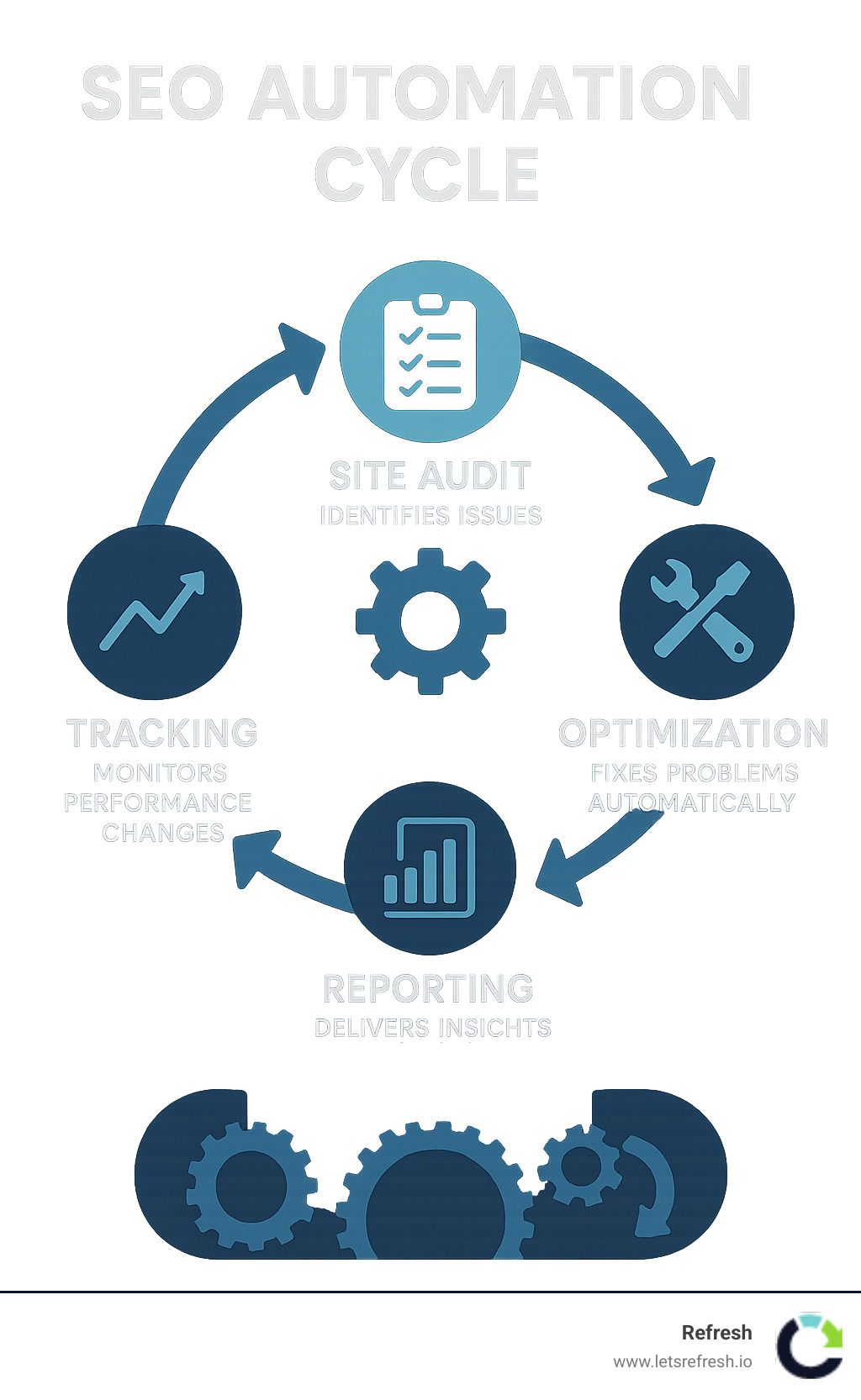Why Search Engine Optimization Automation is Essential for Modern Businesses
Search engine optimization automation is changing how businesses manage their digital presence by using software tools and AI to handle repetitive SEO tasks automatically. Instead of spending hours manually tracking rankings, auditing websites, or optimizing content, automation lets you focus on strategy while machines handle the heavy lifting.
Key Benefits of SEO Automation:
- Time Savings: Automate tasks that used to take hours or days
- Improved Accuracy: Reduce human errors in data analysis and reporting
- Scalability: Handle thousands of pages and keywords simultaneously
- Cost Efficiency: Free up your team for high-value strategic work
- 24/7 Monitoring: Never miss important changes in rankings or site health
The research shows that automation can improve work quality and speed by 2x to 3x or more. As one SEO professional noted, "I have heard many SEO people saying that they are trying push towards automation and already have improved the work quality and speed by 2x, 3x and more."
The reality is simple: your competitors are already automating their SEO workflows. The businesses that accept automation early will gain a significant competitive advantage while others struggle with manual processes.
Common automated SEO tasks include keyword research, content optimization, technical audits, rank tracking, and reporting. Modern tools can even generate meta descriptions, identify internal linking opportunities, and alert you to sudden traffic changes - all without human intervention.
I'm Alexander Palmiere, and through developing over 200 websites at Refresh Digital Strategy, I've seen how search engine optimization automation transforms business workflows and drives measurable results. My experience has shown that the most successful companies combine smart automation with human expertise to create unstoppable SEO strategies.

Common search engine optimization automation vocab:
- best seo tools for small businesses
- what are the best ai seo tools for small businesses
- best local SEO
The Transformative Benefits of Automating SEO
Let's be honest - SEO can feel overwhelming. Between tracking hundreds of keywords, auditing websites, and generating reports, it's easy to get buried in the details. That's where search engine optimization automation becomes your secret weapon.
Why automation matters so much: Modern SEO involves massive amounts of data and repetitive tasks that would take human teams weeks to complete manually. Imagine checking keyword rankings for 500 terms across different locations every day, or scanning a 10,000-page website for broken links. Without automation, you'd spend all your time on busywork instead of growing your business.
The time efficiency gains are remarkable. Many SEO professionals report saving 1-2 hours per blog post through automated workflows. That's time you can reinvest in strategy, creativity, and building relationships with your audience.
But speed isn't everything - data accuracy is where automation really shines. When you're dealing with thousands of data points, human errors are inevitable. Automated tools process information with consistent precision, giving you reliable data to base your decisions on. This means better SEO campaigns and more predictable results.
Scalability becomes effortless with automation. Whether you're managing one website or fifty, automated systems handle the increasing workload without needing to hire more staff. Your workflow streamlining allows you to grow quickly once your site gains momentum.
The competitive advantage is real. While your competitors are still manually checking rankings and generating reports, you're analyzing market trends and optimizing for emerging opportunities. This cost-effectiveness naturally follows - less time on manual tasks means more resources for strategic growth.
If you're wondering which tools can make this happen for your business, check out our guide on what are the best AI SEO tools for small businesses.
Freeing Up Your Team for Strategic Work
Here's the beautiful thing about search engine optimization automation - it doesn't replace human creativity. Instead, it frees up your talented team members to do what they do best.
Think about it: your SEO expert shouldn't be spending hours copying and pasting data into spreadsheets. They should be developing innovative strategies, creating compelling content, and solving complex problems that require human expertise.
When automation handles the repetitive stuff, your team can focus on the work that actually moves the needle. High-level strategy becomes possible when you're not drowning in daily tasks. Your team can identify market opportunities and align SEO efforts with your bigger business goals.
Creativity flourishes when people aren't burned out from manual work. Content ideation, crafting compelling narratives, and understanding what resonates with your audience - these are uniquely human skills that drive real results.
Building quality client relationships requires personal attention and trust. Automation gives you the bandwidth to provide personalized insights and truly understand what your clients need.
The shift from manual task execution to strategic oversight transforms how your team operates. Instead of being task managers, they become strategic partners in your business growth.
Achieving Greater Accuracy and Consistency
Let's face it - humans make mistakes, especially when doing repetitive work. Miss a broken link here, forget to update a meta description there, and suddenly your SEO performance suffers.
Search engine optimization automation eliminates these human errors through consistent, precise execution. Automated tools perform the same checks with the same parameters every time, giving you dependable data you can trust.
This consistent execution is particularly powerful for larger websites. Every audit follows the same thorough process, every report includes the same key metrics, and every optimization applies the same proven rules.
Perhaps most importantly, automated systems provide 24/7 monitoring. They never sleep, never take breaks, and never miss important changes in your rankings or site health. When something goes wrong at 2 AM on a Sunday, you'll know about it immediately.
These standardized processes create a foundation of reliability that lets you make confident decisions about your SEO strategy. No more guessing whether your data is accurate - automation gives you the consistency you need to succeed.
The Core Tasks of Search Engine Optimization Automation

Think of search engine optimization automation as your digital Swiss Army knife. It doesn't just handle one task – it tackles the entire ecosystem of SEO work that keeps your website visible and competitive. From the initial keyword research that guides your content strategy to the ongoing monitoring that catches problems before they hurt your rankings, automation touches every corner of modern SEO.
The beauty lies in how these automated systems work across on-page SEO (optimizing individual pages), off-page SEO (building authority through backlinks), technical SEO (ensuring your site runs smoothly), and content lifecycle management (keeping your content fresh and relevant). Each area feeds into the others, creating a comprehensive approach that would be nearly impossible to manage manually at scale.
Automating Keyword Research and Analysis
Remember the days of manually building keyword lists in spreadsheets? Those hours of copying and pasting search volumes and guessing at competition levels? Automation has completely transformed this foundation of SEO strategy.
Modern tools can perform keyword finding at lightning speed, uncovering not just obvious terms but also hidden gems – those long-tail keywords that your competitors might miss. They analyze search volume patterns and competition analysis simultaneously, giving you a complete picture of opportunity versus difficulty.
Topic clustering is where automation really shines. Instead of thinking about individual keywords, automated tools help you build content clusters around themes. They can even perform SERP scraping to analyze what's already ranking, showing you exactly what type of content Google rewards for specific searches.
Here's something that might surprise you: tools like ChatGPT can dive deep into research to find questions people actually ask about your topic – perfect content for your H2 headings. This approach helps you create content that directly answers searcher intent rather than just stuffing in keywords.
Understanding how to use these findies effectively is crucial. That's why we recommend diving into The Role of Keywords in SEO and How to Use Them Effectively to maximize your keyword research efforts.
Streamlining Content Optimization

Writing great content is an art, but optimizing it for search engines used to be pure drudgery. Not anymore. Search engine optimization automation has turned content optimization into a collaborative process between human creativity and machine precision.
As you write, automated tools provide real-time feedback like having an SEO expert looking over your shoulder. They analyze readability scores to ensure your content connects with your audience, suggest optimal keyword density without making your writing feel robotic, and can even generate compelling meta descriptions that entice clicks from search results.
Alt text creation for images used to be an afterthought, but automation makes it effortless. These tools generate descriptive alt text that helps both search engines understand your images and makes your site more accessible to users with disabilities.
Perhaps most valuable are internal linking suggestions. Automated tools can scan your entire website and identify opportunities to connect related content, creating a web of relevance that both users and search engines love. This internal linking strategy helps visitors find more of your valuable content while distributing page authority throughout your site.
The integration of these optimization features into your content workflow can save hours per piece of content while improving quality. To understand why this matters so much for your business growth, explore our guide on What Is Content Marketing and Why Is It Important for Small Businesses.
Automating Technical SEO Audits
Technical SEO is like the foundation of a house – if it's not solid, everything else becomes shaky. The challenge is that manual technical audits are incredibly complex and time-consuming. You're essentially playing detective across thousands of potential issues.
Automated site crawling changes this completely. These tools can scan your entire website in minutes, performing comprehensive broken link detection, identifying duplicate content, and mapping out redirect chains that might be confusing search engines.
Page speed analysis integration with tools like Google PageSpeed Insights provides detailed performance reports that show exactly what's slowing down your site. Mobile-friendliness checks ensure your site works perfectly on smartphones and tablets – absolutely critical since most searches now happen on mobile devices.
Sitemap generation happens automatically, keeping search engines updated about your site's structure and new content. The real magic occurs when these tools provide duplicate content identification across your entire site, catching issues that could hurt your rankings.
What makes this even better is that many tools let you schedule recurring audits. Your site's health gets monitored continuously, and you receive actionable reports that turn complex technical data into clear, prioritized tasks. We've seen cases where automated technical audits processed by AI provided recommendations that led to 4-5x organic traffic increases.
For those using Webflow, we have specific insights on technical optimization in our Webflow Page Speed Optimization guide.
Automating Rank Tracking and Competitor Monitoring
Imagine trying to manually check where hundreds of keywords rank every day across different locations and devices. You'd spend your entire day just tracking positions, with no time left for actually improving them.
Keyword position tracking automation solves this by monitoring your rankings continuously. These systems track daily or weekly changes, showing you the immediate impact of your SEO efforts. But modern tools go far beyond simple position tracking.
SERP feature monitoring shows when your content appears in rich snippets, featured snippets, or local packs – those special search result features that can dramatically increase your visibility. Competitor rank analysis reveals which keywords your competitors are ranking for and their Share of Voice (SOV) in your market.
Automated alerts for rank changes ensure you're immediately notified of significant shifts, whether positive or negative. This allows for rapid response – you can quickly investigate what caused a drop or double down on what's driving improvements.
The competitive intelligence these tools provide is invaluable. You can identify content gaps where competitors are ranking but you're not, spot new keyword opportunities, and understand market trends before they become obvious to everyone else.
Automating SEO Reporting

Creating SEO reports used to mean hours of copying data from different platforms, formatting charts, and trying to tell a coherent story from scattered metrics. Automated reporting transforms this tedious process into something that practically runs itself.
Data integration seamlessly pulls metrics from Google Analytics, Google Search Console, and other platforms into unified dashboards. You can create custom dashboards in Looker Studio that combine data from multiple sources, giving stakeholders a complete picture of SEO performance.
Scheduled reports are where the real time-saving happens. Set them up once, and they automatically generate and send daily, weekly, or monthly updates to your team or clients. No more scrambling to pull together monthly reports at the last minute.
White-label reporting options let you brand these reports with your own logo and styling, maintaining a professional appearance that builds trust with clients. The consistency of automated reporting means everyone receives the same high-quality insights every time, eliminating the variability that comes with manual report creation.
The change from spending hours on reporting to having insights delivered automatically frees up your team to focus on strategy and implementation – where the real SEO magic happens.
Implementing and Balancing Your Automation Strategy

The promise of search engine optimization automation is exciting, but jumping in headfirst isn't the smartest approach. Think of automation like learning to ride a bike - you wouldn't start by racing down a steep hill. Instead, successful implementation requires patience, planning, and a clear understanding of what you want to achieve.
The key is finding the sweet spot between human creativity and machine efficiency. We've learned through building over 200 websites that the most successful automation strategies start small and grow thoughtfully. It's about identifying those tedious bottlenecks that drain your team's energy, then systematically addressing them one by one.
Setting clear goals from the beginning makes all the difference. Are you trying to save time on reporting? Improve the accuracy of your technical audits? Scale your content optimization? Once you know what success looks like, measuring ROI becomes much more straightforward.
Getting Started with Search Engine Optimization Automation
The beauty of starting your automation journey lies in its simplicity. You don't need to overhaul your entire workflow overnight. Begin by identifying repetitive tasks that eat up hours of your week - those mundane activities that make you think "there has to be a better way to do this."
Choosing the right tools comes next, and this is where many businesses get overwhelmed by options. Focus on tools that integrate well with what you're already using. If you're comfortable with Google Search Console and Google Analytics, look for automation tools that pull data from these sources seamlessly.
The magic happens when you start with one area rather than trying to automate everything at once. Maybe begin with rank tracking since it's straightforward and shows immediate value. Once that's running smoothly, you can tackle technical audits or content optimization.
Setting up workflows means creating clear processes for how these automated tasks fit into your existing routine. Who reviews the automated reports? When do you act on the insights? How do you ensure nothing falls through the cracks?
Most importantly, training your team ensures everyone understands that automation improves their work rather than replacing it. Your team members become strategic overseers rather than manual task executors, which is usually much more fulfilling work.
If you're feeling uncertain about managing this transition internally, our guide on How to Choose an SEO Company for Your Small Business can help you evaluate whether external expertise might accelerate your automation journey.
The Role of AI in Modern SEO
Artificial Intelligence has moved from science fiction to everyday reality in search engine optimization automation. We're seeing AI Actions that embed generative AI directly into workflows, taking the friction out of content creation and publication. It's like having a tireless assistant who never gets bored with repetitive tasks.
Generative AI excels at content brief creation, helping outline articles, generate compelling headings, and suggest relevant subheadings. We use AI extensively for content planning because it can process vast amounts of data and identify patterns that humans might miss. The key is maintaining human oversight - AI provides the foundation, but human creativity and judgment ensure quality.
Predictive analytics powered by AI helps us forecast trends and spot potential issues before they become problems. Imagine knowing that a technical SEO issue is likely to impact your rankings next month, giving you time to fix it proactively rather than reactively.
AI agents represent the cutting edge of automation, capable of performing complex tasks with minimal human intervention. We've seen cases where AI analyzes technical SEO reports and provides prioritized recommendations that lead to 4-5x organic traffic increases. The technology is becoming remarkably sophisticated.
Google's introduction of AI Overviews means we need to optimize not just for traditional search results but also for AI-generated answers. This shift requires automation tools that can adapt to new search landscapes and optimize content for these emerging formats.
To understand how AI is reshaping the broader digital landscape, explore The Role of AI and Chatbots in Modern Website Development.
The Future of Search Engine Optimization Automation
The trajectory of search engine optimization automation is heading toward increasingly sophisticated autonomous systems. We're moving into an era where AI agents won't just execute tasks but make strategic decisions, learn from outcomes, and adapt strategies in real-time.
Autonomous agents represent the next evolution of SEO automation. These systems will handle complex strategic tasks that currently require human expertise, while still maintaining the need for human oversight and creativity. Think of them as incredibly smart assistants that can manage entire aspects of your SEO strategy.
Hyper-personalization is becoming possible as automation tools learn to tailor content and user experiences to individual searcher intent. This means your website could automatically adjust its messaging and content based on how different visitors arrive and what they're looking for.
Voice search optimization automation is expanding rapidly as more people use voice assistants. Automated systems are becoming better at optimizing content for conversational queries and natural language patterns.
Proactive issue detection is getting remarkably sophisticated. Instead of waiting for problems to impact your rankings, future automation tools will predict issues before they happen and either fix them automatically or alert you with plenty of time to respond.
The rise of Generative Engine Optimization (GEO) means we're optimizing for AI-generated answers, not just traditional search results. This requires automation tools that understand how AI systems process and present information.
For insights on preparing for voice search evolution, check out The Impact of Voice Search on SEO and How to Adapt Your Strategy.
The future is bright for businesses that accept automation thoughtfully, combining the efficiency of machines with the creativity and strategic thinking that only humans can provide.
Frequently Asked Questions about SEO Automation
What are the biggest limitations of SEO automation?
While search engine optimization automation offers tremendous benefits, it's important to understand its boundaries. The biggest risk comes from over-reliance - treating automation as a magic solution that can handle everything without human oversight.
Automation struggles with creativity and nuance. AI can analyze data and follow patterns, but it can't replicate the spark of human creativity that makes content truly engaging. It might miss the subtle cultural references, brand voice quirks, or emotional connections that resonate with your audience.
Strategic decision-making remains firmly in human territory. When faced with complex scenarios or unexpected algorithm changes, automation tools can't adapt with the same flexibility as an experienced SEO professional. They follow their programming, but they can't think outside the box when situations call for innovative solutions.
Perhaps most concerning is the potential for errors at scale. If an automated system is misconfigured or fed incorrect data, it can spread mistakes across hundreds or thousands of pages in minutes. What might be a small error manually becomes a site-wide crisis when automation amplifies it.
The key is balance. Automation excels at compiling and processing large amounts of complex data, but it's up to skilled SEO professionals to interpret that information and make meaningful improvements.
Can automation replace my SEO team?
This question comes up constantly, and the answer is a resounding no. Search engine optimization automation is designed for augmentation, not replacement. Think of it as giving your team superpowers rather than showing them the door.
Automation handles the grunt work - the repetitive tasks that eat up hours but don't require creative thinking. This frees your team to focus on what humans do best: developing strategy, building relationships for quality backlinks, adapting to algorithm changes, and creating content that truly connects with your audience.
Your SEO team becomes more valuable, not less. They move from being task executors to strategic thinkers and creative problem-solvers. Complex analysis, client relationships, and innovative solutions all remain firmly in human hands.
As automation takes care of the tedious work, your team can spend more time on competitive analysis, content strategy development, and the relationship-building that drives long-term SEO success. The result? A more engaged, strategic, and ultimately more effective team.
How do I measure the ROI of SEO automation?
Measuring the return on investment for search engine optimization automation involves tracking both hard numbers and softer benefits that impact your bottom line.
Time savings provide the most obvious metric. Calculate the hours your team previously spent on automated tasks and convert that into salary costs. If automation saves 10 hours per week at $50 per hour, that's $26,000 annually - often far more than the cost of automation tools.
Track accuracy improvements by monitoring the reduction in errors like broken links, missing meta descriptions, or indexing issues. These mistakes can hurt rankings, so preventing them has real value.
Performance metrics tell the bigger story. Monitor improvements in keyword rankings, increases in organic traffic, and growth in lead generation. While these results take time to materialize, they represent the true value of more efficient SEO processes.
Faster task completion also matters. If technical audits that once took days now happen in hours, your team can respond to issues quickly and work on more projects.
Don't forget the qualitative benefits: happier team members freed from tedious work, better strategic focus, and improved decision-making based on more accurate data. These improvements are harder to quantify but contribute significantly to long-term success.
A simple rule of thumb: if the monthly cost of automation tools is less than hiring someone to perform those tasks manually, it's likely worthwhile. For context on SEO timelines and expectations, explore The Timeline for SEO Success When to Expect Results.
Conclusion
Search engine optimization automation is essential for competing in today's digital landscape. It revolutionizes workflows by freeing up valuable time, increasing data accuracy, and enabling scalability.
The true power lies in combining AI with human expertise. This partnership lets AI handle repetitive tasks, while SEO specialists focus on creativity, strategy, and complex problem-solving. The synergy leads to more efficient and effective campaigns, giving businesses a significant competitive advantage.
At Refresh, we help businesses integrate smart automation without losing the human touch. We guide you through implementing these powerful tools to ensure your SEO efforts are optimized for maximum impact.
Ready to optimize your process? Explore our SEO services and find how the perfect blend of automation and human expertise can revolutionize your digital presence.




.avif)


